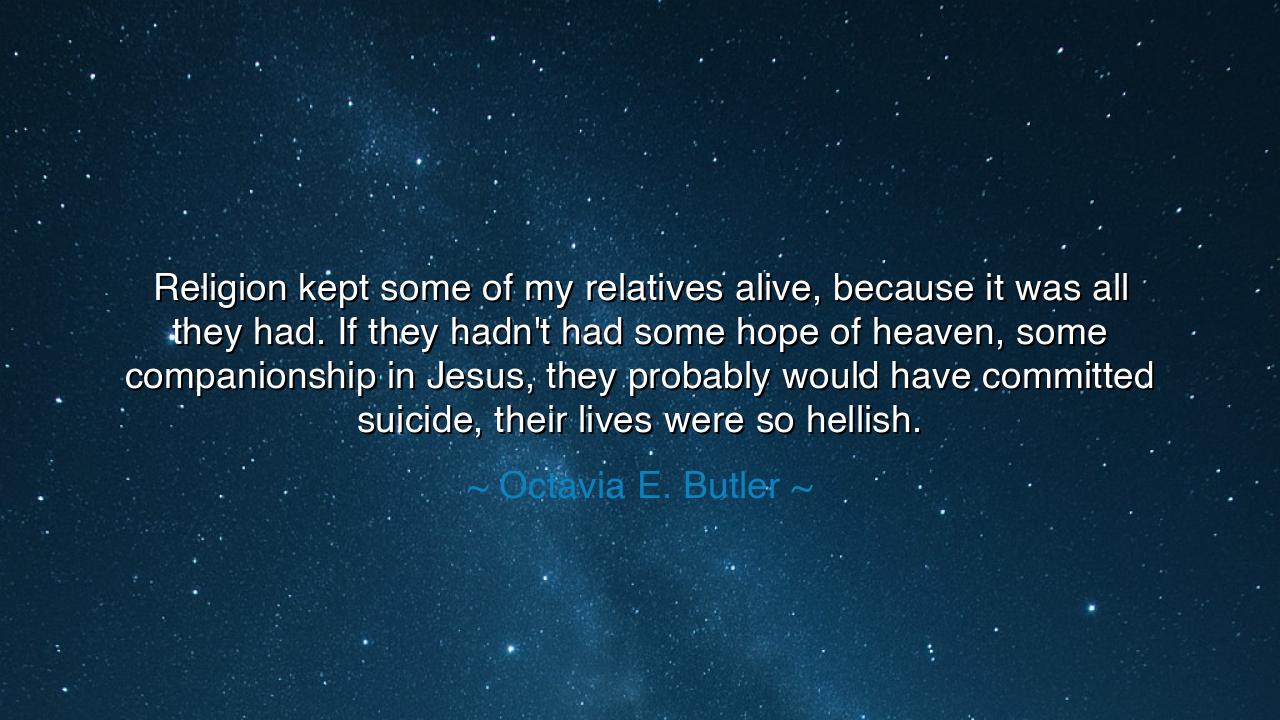
Religion kept some of my relatives alive, because it was all they
Religion kept some of my relatives alive, because it was all they had. If they hadn't had some hope of heaven, some companionship in Jesus, they probably would have committed suicide, their lives were so hellish.






“Religion kept some of my relatives alive, because it was all they had. If they hadn't had some hope of heaven, some companionship in Jesus, they probably would have committed suicide, their lives were so hellish.” Thus spoke Octavia E. Butler, the great seer of human destiny — a woman who gazed upon the sorrows of this world and still dared to write of hope. In this truth, she did not speak of religion as a doctrine, but as a lifeline, a fragile yet radiant thread stretched across the abyss of suffering. Her words are not praise for dogma, nor condemnation of despair, but an acknowledgement of the mysterious strength that faith can give when all else has failed.
Butler was born into the hard soil of oppression — the descendant of slaves, raised in a world where poverty, racism, and loneliness sought daily to crush the human spirit. She saw, as many have seen, that some people endure not because they are strong, but because they believe. The promise of heaven, the whisper of companionship in Jesus, became for her relatives a refuge from the brutality of life. Their faith was not a luxury; it was survival. In believing that a greater love awaited them beyond the grave, they found the courage to live another day within it.
This is the paradox of faith: it thrives most fiercely where the world is darkest. To those who have never known despair, religion may seem superstition. But to those who have stood at the edge of nothingness, it is light — not the light of knowledge, but the light of endurance. It tells the weary soul: you are not alone; your pain is seen; your suffering is not in vain. And sometimes, that belief — however fragile — is the difference between breath and silence, between life and the grave.
History too bears witness to this truth. When the enslaved people of the Americas were stripped of their names, their languages, and their gods, they did not let their spirits die. They found in the story of Jesus — a man beaten, betrayed, and crucified — a reflection of their own suffering. Through spirituals, they wove their grief and hope into song. “Swing low, sweet chariot,” they sang, not only of heaven but of freedom, of deliverance, of dignity. Their religion was not submission; it was defiance disguised as devotion. It was the soul’s rebellion against despair.
And yet, Butler’s words also carry a quiet sorrow. She knew that such faith, born of desperation, is both sacred and tragic. Sacred, because it keeps the flame of hope alive. Tragic, because no one should have to depend upon heaven to survive the injustices of earth. In her reflection, there is compassion — not mockery, not pity, but understanding. She knew that for many, faith was the last sanctuary of the oppressed heart, the only voice that whispered, “You are loved,” when the world refused to say it.
So what are we to learn, O seekers of wisdom? The lesson is not to worship blindly, nor to scorn those who do, but to honor the human need for meaning. For without meaning, no mind can bear the cruelty of existence. If faith gives comfort, let it be blessed. If reason gives strength, let it serve. But let no one mock another’s hope, for in that hope may dwell the final thread that holds a life together.
Therefore, let your heart be both wise and tender. When you see another clinging to faith, see not weakness but courage — the courage to keep breathing in a world that breaks the soul. And if you have no religion, create your own sacredness: in kindness, in art, in service, in love. For what Butler teaches us is this — that every soul needs something to believe in, something that tells it life is still worth living. Be that voice for yourself, and for others, so that none must face the darkness alone.
For in the end, the meaning of Butler’s words is eternal: hope is holy, no matter its form. Whether spoken in prayer or written in silence, it is the seed of survival. Guard it, nourish it, and share it — for in keeping one another alive, we become the very faith the world still needs.






AAdministratorAdministrator
Welcome, honored guests. Please leave a comment, we will respond soon